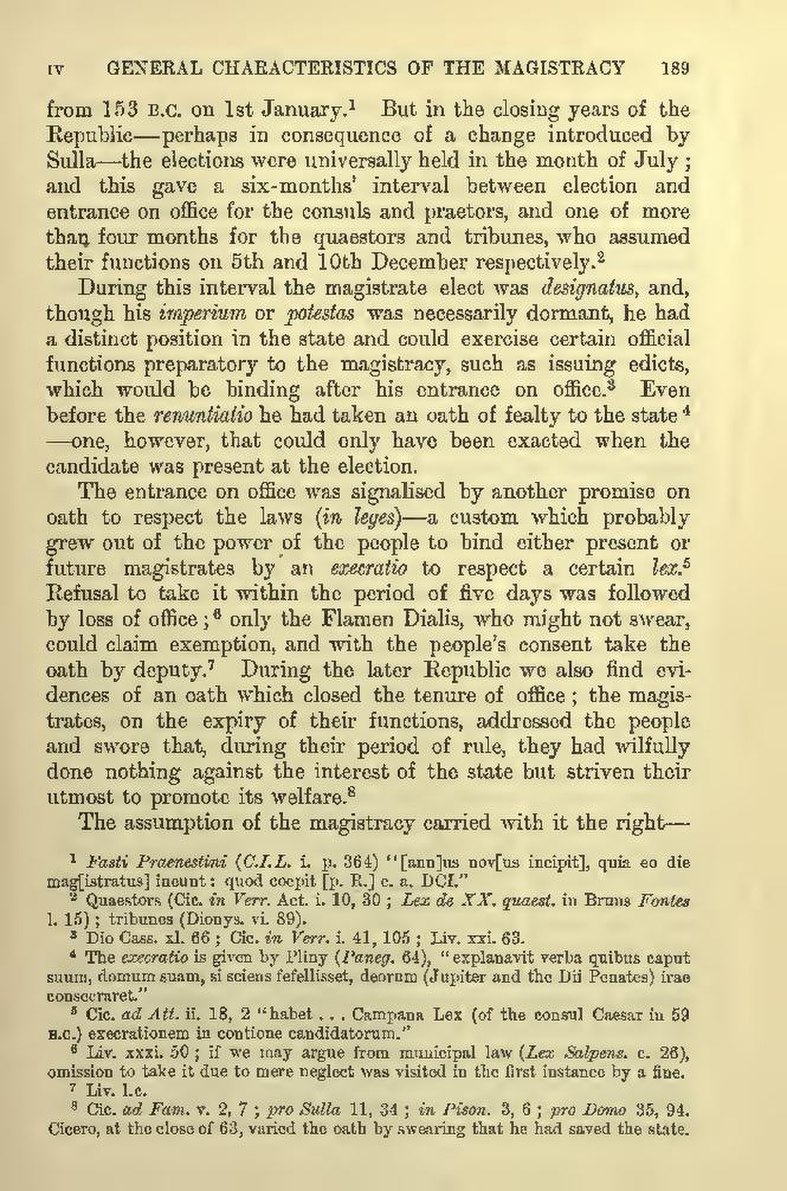from 153 B.C. on 1st January.[1] But in the closing years of the Republic—perhaps in consequence of a change introduced by Sulla—the elections were universally held in the month of July; and this gave a six-months' interval between election and entrance on office for the consuls and praetors, and one of more than four months for the quaestors and tribunes, who assumed their functions on 5th and 10th December respectively.[2]
During this interval the magistrate elect was designatus, and, though his imperium or potestas was necessarily dormant, he had a distinct position in the state and could exercise certain official functions preparatory to the magistracy, such as issuing edicts, which would be binding after his entrance on office.[3] Even before the renuntiatio he had taken an oath of fealty to the state[4]—one, however, that could only have been exacted when the candidate was present at the election.
The entrance on office was signalised by another promise on oath to respect the laws (in leges)—a custom which probably grew out of the power of the people to bind either present or future magistrates by an execratio to respect a certain lex.[5] Refusal to take it within the period of five days was followed by loss of office;[6] only the Flamen Dialis, who might not swear, could claim exemption, and with the people's consent take the oath by deputy.[7] During the later Republic we also find evidences of an oath which closed the tenure of office; the magistrates, on the expiry of their functions, addressed the people and swore that, during their period of rule, they had wilfully done nothing against the interest of the state but striven their utmost to promote its welfare.[8]
The assumption of the magistracy carried with it the right—*us nov[us incipit], quia eo die mag[istratus] ineunt: quod coepit [p. R.] c. a. DCI."]
- ↑ Fasti Praenestini (C.I.L. i. p. 364) "[ann
- ↑ Quaestors (Cic. in Verr. Act. i. 10, 30; Lex de XX. quaest. in Bruns Fontes l. 15); tribunes (Dionys. vi 89).
- ↑ Dio Cass. xl. 66; Cic. in Verr. i. 41, 105; Liv. xxi. 63.
- ↑ The execratio is given by Pliny (Paneg. 64), "explanavit verba quibus caput suum, domum suam, si sciens fefellisset, deorum (Jupiter and the Dii Penates) irae consecraret."
- ↑ Cic. ad Att. ii. 18, 2 "habet . . . Campana Lex (of the consul Caesar in 59 B.C.) execrationem in contione candidatorum."
- ↑ Liv. xxxi. 50; if we may argue from municipal law (Lex Salpens. c. 26), omission to take it due to mere neglect was visited in the first instance by a fine.
- ↑ Liv. l.c.
- ↑ Cic. ad Fam. v. 2, 7; pro Sulla 11, 34; in Pison. 3, 6; pro Domo 35, 94. Cicero, at the close of 63, varied the oath by swearing that he had saved the state.
